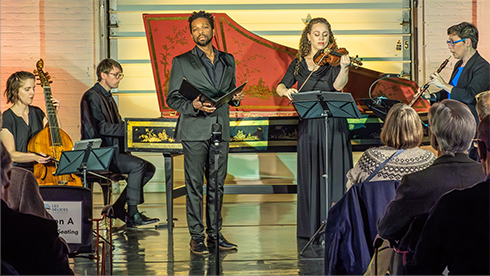The ancient Greek legend of Orpheus and Eurydice is much on the minds of two local organizations this month.
From March 21-24, Oberlin Opera staged four performances of Claudio Monteverdi’s 1607 L’Orfeo in Hall Auditorium.
From March 8-10, Les Délices related the tale of Orpheus’ ill-fated visit to the Underworld to rescue his wife Eurydice from the clutches of Pluto in music by Philippe Courbois, Jean-Philippe Rameau, Georg Philipp Telemann, and most recently by Jonathan Woody in his cantata By much love betray’d.
Also a celebrated baritone, Woody took the role of the god of music himself, assisted by mezzo soprano Sophie Michaux, baroque oboist Debra Nagy, violinist Shelby Vamin, gambist Rebecca Landell, and harpsichordist Mark Edwards. I heard the last of three performances on Sunday, March 10 at Disciples Center.
Many of Les Délices’ followers probably watched the ensemble’s earlier SalonEra episode on the Orpheus legend online, which shared content with this season’s live performance. They will already know that there are subtle variations on the story. Nagy’s clever interleaving of the musical selections allowed the richness of the narrative to come through.
She chose to begin “Song of Orpheus” with “The Gift” and “The Turn,” the first two movements of Woody’s cantata. “The Rend,” in which Dionysius’ Maenads, “weary of his incessant mourning of Eurydice,” rip Orpheus to pieces, ended the musical narrative.
Each composer took up the tale at a different point, and each brought a personal musical perspective to the story. Courbois begins with a dialogue between Orpheus and Pluto. Rameau reflects on Orpheus’ inability to fulfill Pluto’s terms through his impatience. Telemann has Orpheus soliloquizing to the wild animals about the impotence of music to stop his pain (he throws off his laurel wreath and lyre in disgust).
The poetry-rich program (which took up six pages of text and translation) was leavened by Mark Edwards’ improvised prelude to the Rameau, and by Woody’s wordless trio sonata, which substitutes musical gestures for words. By far the most interesting musical treatment of the Orpheus tale was Telemann’s (sung in German).
As Orpheus, Woody’s vocalizations were powerfully dramatic. Michaux’s, though more lyrical, also put the text in front of the music in an engaging way. She also made a brief and effective cameo appearance offstage as Echo.
Superb playing from Nagy (oboe), Vamin (violin), Landell (gamba), and Edwards (harpsichord) helped lift the performance onto a high level.
I must admit that after hearing all the rhetoric about Orpheus and his fate, I longed to revisit the simple but perfect little Victorian parlor song in which Arthur Seymour Sullivan reminds us of Orpheus’ gift of music to mankind via the words of William Shakespeare in Henry VIII. It’s sung here by Dame Janet Baker with Gerald Moore at the piano.
Orpheus with his lute made trees,
And the mountain tops that freeze,
Bow themselves when he did sing:
To his music plants and flowers
Ever sprung; as sun and showers
There had made a lasting spring.
Every thing that heard him play,
Even the billows of the sea,
Hung their heads, and then lay by.
In sweet music is such art,
Killing care and grief of heart
Fall asleep, or hearing, die.
Published on ClevelandClassical.com March 21, 2024.
Click here for a printable copy of this article



